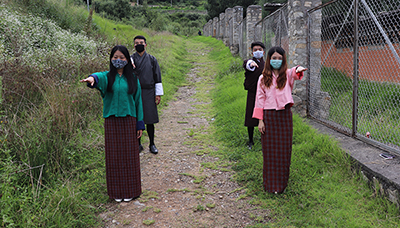
Picture Courtesy: UNICEF Bhutan
Being vaccinated does not mean one is safe from the clutches of the Coronavirus. As new strains and mutations of the virus emerge, the United Nation International Children’s Fund (UNICEF) and the World Health Organisation (WHO) warn that the threat of the disease is far from over. Vital measures such as hand-washing with soap, wearing masks and avoiding crowds are still highly recommended to reduce the risks.

The joint press release from the UNICEF and WHO country offices states, when complacency creeps in towards safety protocols, Bhutan, despite vaccination, will remain susceptible to reinfection and worse, mass transmission.
Such a situation would overwhelm the health system and the already overburdened health workers.
Health experts say, being vaccinated protects one from falling seriously ill and being hospitalised from COVID-19 infection. However, the risk is still there.
A vaccinated person can get infected with COVID-19 and transmit it to another. Despite vaccination, the stakes are too high as new variants such as the highly infectious Delta variant appear.
The Health Minister, Dechen Wangmo said, “I think the biggest concern we have is the mutation of the virus. We are already aware that the most prevalent variant in the country is the Delta variant. And what we are seeing across the world is that with the Delta variant, the transmission is much higher.”
“So, if somebody has the virus, it gets transmitted to many people very fast, very quickly and it is creating an outbreak within the unvaccinated and the vaccinated population as well,” the health minister added.
In the face of the current surge sweeping across the region and a third wave that is likely to hit the region, the UNICEF and WHO mentioned that despite the successful second jab of all the eligible Bhutanese population, people should continue following COVID safety guidance and protocols.
Karma Wangdi and Tshering Dendup








